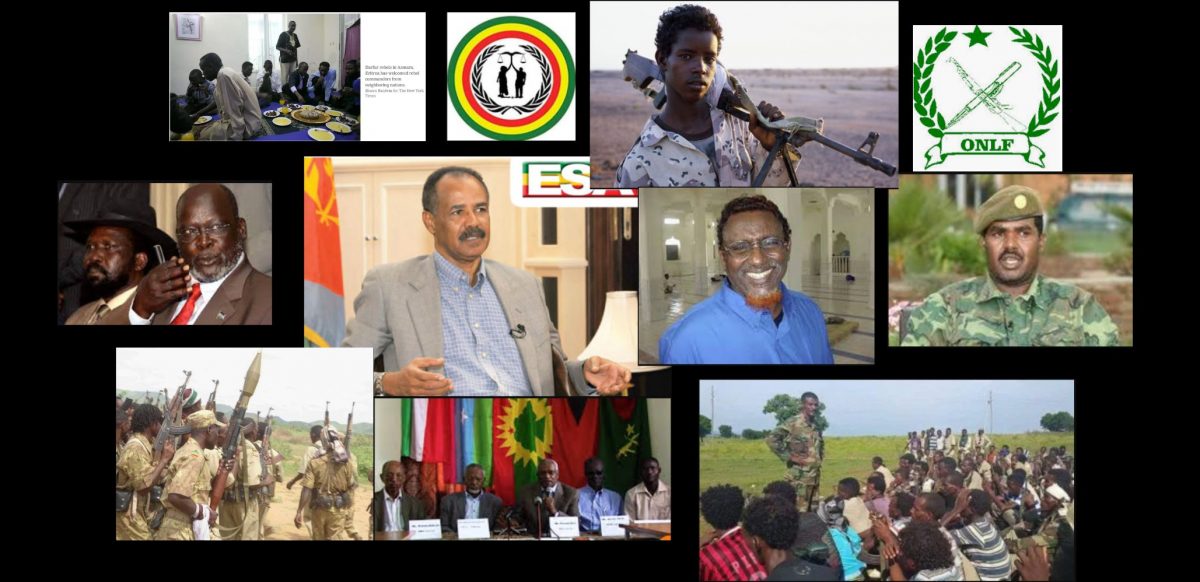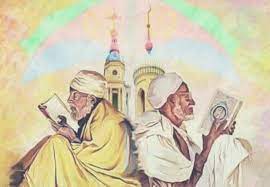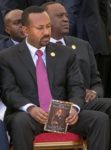How Ethiopia’s Prime Minister Abiy came to power is worthy of a short book by an author like John Lee Anderson, who already got him to tell us a lot, including his contempt for his predecessor Hailemariam Desalegn and his love for America, so much so, he would die for her. His version of The Art of War: How To Grab & Consolidate Power is articulated in a book (in Amharic) which you can read (pdf); listen to the 6-hour (Amharic) audio book version of it on YouTube, or read a review of it (English) which was published by Aiga Forum. A sample that makes the rounds of social media, whenever a former friend becomes a foe (as if to say: we should have known!) is this one:
- እንዳይመለስ ሆኖ ያልተሸኘ ጠላት ጊዜ ጠብቆ ዳግም ለማጥቃት እንደሚመጣ ጥርጥር የለውምና:: ታዲያ ጊዘ ሲደርስ ልክ እንደ ነብር: ኮቱን ሳያሰሙ ከጀርባ ቀብ ማድረግና ህልሙን ባንድ ጀንብር ማምከን መረሳት የለባትም: ወይም ስዉር የሆነ ወጥመድ ማዘጋጀት ይበጃል:: ሰዎች ራስ ወዳድ ናቸውና በጥቅም ሂድባቸው:: የሚፈልጉትን ነገር እያሳይህ ወደ ምትፈልገው ስፍራ ውሰዳቻውና ጣላቸው:: ክዚያም “በሬ ሆይ: ሳሩን አይተህ ገደሉን ሳታይ” የሚለው ተረት ተርትባቸው:: ይህን መሰሉ ለዘብትኛ የሃይል አጠቃቅም ዘዴ ሰላም ሳይበጠበጥ ህዝብም ሳያጉረመርም የተደላደለ ስልጣን ባለቤት ለመሆን ያግዛል::
- There is no doubt that an enemy who has not been bid farewell will wait for a time to attack again. So, when the time comes, just like a tiger, you must pounce on the enemy without letting them hear your footsteps; and orphan their dreams quickly. Or, it is better to prepare a hidden trap. People are selfish; so, take advantage of them. Show them the things they desire, but take them to the place you want and ditch them. Then tell them the tale: “O bull! You saw the grass, but you didn’t see the cliff.” Such a method of moderate use of force helps to consolidate power without disturbing the peace and without the people complaining.
In the Aiga Forum review of the book, the reviewer says this: “He [Abiy Ahmed] argues that Ethiopian political history is full of adventurous cruel actions and this is deeply rooted in the culture of the Ethiopian peoples who praise the killers and territorials [sic] like lion.”
An Underestimated Imperial Man
TPLF, which had convinced itself that it was Horn of Africa’s (hell, maybe even Africa’s) strongest military power saw the man who overthrew them (Aboy Sebhat: “with close consultation with America!) as a freak accident of history. How can such a lightweight, such an obvious fraud, hope to assume power and centralize it? They spent two whole years trying to prove it. But there was no Meles II to guide them and, earned or unearned, they had accumulated too many enemies. With the only gateway locked to them, they had to create another door to open the encirclement, and they marched to Addis Abeba to get better negotiating terms (if only there was someone to negotiate with.)
A man obsessed with history (mostly, his place in it), Abiy is collecting honorary titles on his chest. He first conned Europe’s Gullibility Headquarters–the Nobel Committee–to give him the Nobel Peace Prize and he immediately embarked on proving them wrong. He is the GERD-finisher, TPLF-tamer but that is hardly enough to have biographies written about you, and to occupy pages in school textbooks. He is off to a new grandness. Although he often mentions Haile Selasse I admiringly, he is most like King Yekuno Amlak, a man who overthrew an entrenched Ethiopian dynasty then took care of people who had no business being in control of Ethiopia’s natural and God-ordained right to the Sea. He “liberated” that too.
Abiy has no use for Ethiopian “liberation fronts” and he has recent vindication to prove that, for the most part, they are easy to buy off or liquidate. Consider all the Eritrea-based Ethiopian armed groups that were struggling to overthrow EPRDF and had nothing to do with its demise. In the end, the highest office they got was…. Ministry of Education where they will be forever associated with a scandal (3% high school pass rate.) Where are the rest–the Oromo, Beni Shangul, Arbegnoch, Ogaden, movements with all their wonderful logos? All marginalized and/or co-opted.

“Infiltrate, take over” is more to his liking. Make them believe you are one of them, until you don’t have to; then take over everything: armed forces, security and media. Then just give happy talk about all the great things that will happen in Ethiopia, in just a few years. Now that he got what he wanted from Isaias–help in vanquishing a menacing foe–he has moved on. It’s not you; it’s me.
His former best friends, almost to a person, now say that the man they credited for reuniting the Tewahdo Church, tried to split it. The man who helped them return their “stolen Amhara lands”–one of them did a broadcast from the new “Amhara-Eritrea border” a couple of years ago– now wants to disarm them so he can give those lands to his TPLF comrades. He, they say, has an Oromo Supremacist Ideology, waving his Egyptian-looking flag, in our sacred capital.
But he knows something else:
Ethiopia’s greatest asset is its population and the World Powers (New, Old) belief that Ethiopia is Too Big To Fail. It is not in his style to support some Eritrean armed opposition group; and he knows from Ethiopian history, than no amount of cruelty by an Ethiopian king is too much, as long as he is doing it in the name of Ethiopia. I mean even Emperor Tewodros is venerated to this day, including at Ethiopian Diaspora restaurants. That’s why he doesn’t feel threatened by Fano, notwithstanding all the “victory news” that the media outlets he calls “Obituary Channels” announce daily.
Taking Abiy Ahmed Seriously
Did you know that today is the 116 anniversary of the formation of the Ethiopian National Defense Forces? You didn’t? Neither did the Ethiopian National Defense Forces. It was not celebrated at its 50th, 75th, 100th anniversary, not even by Mengistu Hailemariam who loved Soviet style military parades. If you are laughing at that, don’t: that was what TPLF was doing when he was inaugurating “Friendship Park” with military showcases (parachute jumpers!) on the eve of the breakout of their two-year war. In his new address on Made Up Anniversary Day, he said Ethiopia’s wars were always defensive (in defense of the ambition of their kings); Ethiopia has never attacked a country (Somalia, Eritrea would disagree), and it has never been defeated (Italian occupation of Ethiopia by Mussolini’s army for 5 years notwithstanding.) He also said that all his talk about the Red Sea was never meant to be a desire to use force, no, no, no, it was to solve problems diplomatically (as he is doing now with Fano)
Show them the things they desire, but take them to the place you want and ditch them. Then tell them the tale “O bull! You saw the grass, but you didn’t see the cliff.”
Those who dismiss him do so at considerable risk. In his next much publicized video, I hope Eritrea’s informal Spokesperson, Awel Seid–ወዲ ሓውቦይ as he addresses his audience, poor ጔል ሓውቦይ–will have more relevant information from the man he calls “my teacher” (መምህረይ!) and will eschew the normal testosterone injection masquerading as a video and tell us something that reassures us Eritrea is going to be safe, without asking us to dismiss Abiy Ahmed.
Sometimes, I think the only Eritrea that Abiy knows is the Eritrea he learned about from President Isaias, Yemane Gebreab, Osman Saleh and the Ethiopian diplomats they associated with during the honeymoon years. (Damn, I used to think our honeymoon with TPLF, 91-97 was short, but our honeymoon with Abi 2018-23 is even shorter.) On March 29, 2021, an Ethiopian Foreign Ministry Spokesperson, Ambassador Dina Mufti, said: “The Eritrean people do not like the day they were separated from Ethiopia, and we do not have a different feeling from theirs.” The statement was never recalled by Ethiopia, nor protested by the Eritrean Government.
Abyssinian Theory on Eritrea’s Red Sea
-
- Eritrea is a country with the wrong demographics (too few, too Mohammedan); it can’t be trusted with something as important to Ethiopia as the Red Sea.
It is a theory shared by Abyssinian rulers that Abiy admires. It is also a theory shared by the West. The Red Sea, with the exception of Eritrea, is all Arabs and Mohammedans–Egypt, Sudan, Djibouti, Yemen, Saudi Arabia. It is not that people have anything against Mohammedans; it is just that they are one “Allahu Akbar” away from being Jihadists. You know how cliquish they are. Today they ask you to make Arabic the official language; tomorrow to join the Arab League, and the day after they are pledging solidarity with Hamas. Besides, every enemy that came to attack Ethiopia–Egypt, Turkey, Italy–used the Red Sea to attack us. How are these people going to be trusted with 1,000 km coastline in one of the busiest, and most strategic inlets?
On top of being too few to guard 1000 kilometers, they have an aging government with no succession plan.
While it is ill-advised to underestimate him, it is also ill-advised to assume he always knows what he is talking about. I noticed that in one of his presentations on Drop of water (in blue font) to Red Sea (in red font), he showed an image I had used in an article entitled “A Confederation We Did Not Vote For.” We likely bought the image from the same store. But in this week’s presentation about “Loan to Riches” (“Good To Great”; “Poor Dad, Rich Dad”: all his titles are from motivational books), he needed some image to indicate religious harmony, and he used one that originally appeared in an Eritrean website (Humans-of-Eritrea; itself modeled after Humans of New York), which was then used by every other Eritrean media. I am sure I have used it too:

So I ask an Ethiopian friend: “you think he reads Eritrean articles?” The friend, an Abi-hater, says: “Not him: he is illiterate; he prefers Daniel Kibret to summarize it for him. But his people may have read it.” That’s just harsh: I happen to know that not only that he reads, but he prefers books to magazines and newspapers. Well, that’s what he told his interviewer during the Honeymoon Years (with a bodyguard doing his “guarding an important person” pose captured in the interview.)
Eritrea’s Position On Its Red Sea
All to say this: if Prime Minister Abiy Ahmed is genuinely confused about how Eritreans feel about their ports, sir: besides the legal, we have historical, sentimental, economical, political reasons for holding on to them. You should know as someone who fought in Badme, as a colonel in the Ethiopian National Defense Forces (ENDF), our whole 20 year (1998 to 2018) stalemate with Ethiopia was driven by our desire, nay, obsession to hold on to a piece of land most of us had never heard of and have no intention of visiting: Badme. That should give you an idea about how we feel about our ports. Let me use your arguments, although my presentation will not be as fancy as yours.:
- Historical/Sentimental:
This is an argument I am making with all our Ethiopian friends and neighbors who, notwithstanding what they think about Abiy, still agree with his arguments. Whenever you site historical claims for our Red Sea, I see your time frame is very self-serving: Axum, Alula, Haile Selasse. Okay, I will pick the period: how about the last 466 years? This is what history tells us as to who was in charge of the Erythraean Sea:
- Ottoman Empire: (1557 to 1865)
- Egypt (1865-1885)
- Italy: (1889-1941)
- England (1942-1952)
- Ethiopia (1952-1991)
- Eritrea (1991-present.)
Ethiopia was absent for all but 40 years. This is hardly a basis for any historical claims.
Even if you want to go further back in history, you will find the Beja Kingdom. Further back, it is what you call Axumite, but what we call Adoulisian civilization.
Culturally, the ports are heavily Arab-influenced: the most ancient writing at Massawa, Assab, Adulis is all Arabic. This is not a fit for you, Abinet. Sentimentally, I would bet Eritreans of every generation know Yemane Barya’s ወደባት ዓደይ (“the ports of my country”) crooned during Haile Selasse’s occupation. Slightly fewer know ፈንቅል (“overturn”) the name of the song detailing the liberation of Massawa in 1990.
(An aside: Because this is the Year of the Surreal, some Eritreans who spent half their political time de-legitimizing the Eritrean Revolution celebrated their liberation of a street in Europe by singing this song.)
- Economical:
I don’t mean to be vulgar but I have to use your terms. Consider the economic cost of 30 years of war: that’s how expensive the ports are. That’s nothing compared to what Djibouti is charging you to use its ports. There is nothing you can give us to make us give it up–and I love me some Ethiopian Airlines, and I am a big booster of GERD–although you may have finished the project just about the time dams will not be economically viable (like the time I decided to create this website, when websites were dying.) But nothing you (or anybody else: nothing personal) can give us would economically make senses to trade a piece of land. Long term leases: sure! That is how countries solidify relationships (integration). Sell? No. It’s not eligible for መድደመር (adding) but we would very much love complementarity.
But I never declared war, you say. True, but what you said is, “Nice ports, you have; it would be a shame if something were to happen to them because you couldn’t sell me some beachfront property and you forced me to take desperate measures.”
- Political/Social
I am all for a fair deal on ports: one that doesn’t make each side feel they have been tricked. It is human nature to have buyers’ remorse. One can give two examples: one from Ethiopia and another from Eritrea. Many Ethiopians believe Meles Zenawi had maximum leverage–facilitating or being an obstacle to recognition of Eritrea by UN–to extract the best deal for Ethiopia on ports; instead, he made Ethiopia permanently and legally landlocked. Similarly, we Eritreans congratulated ourselves for calmly accepting a binding court decision that gave Hanish Kabir Island to Yemen. Until we decided, no, that was America that instigated the war and gave away our islands. I pray some future Eritrean leader will not tell a future parliament “let’s talk about Hanish Islands.”
A fair deal is one that recognizes the value of the ports to you (lowest transportation costs possible, maximizing exports) and to us (reliable revenue, reduced cost of imports due to economies of scale, shared assets.) Fair deals are sustainable. You may say any deal with Isaias is never sustainable, and you may be right –although the mining companies with whom he has long-term arrangements haven’t complained so far.
Beyond that, to sell, to swap, to confederate, to federate, to have shared sovereignty? You can’t have shared sovereignty without people’s sovereignty, so each side can have a way out. There is nothing close to popular sovereignty in the whole neighborhood. We are all nations led by soldiers and hereditary rule.
Confederacy, federalism without people’s sovereignty (and not just a segment of the people, but the whole people) is doomed to fail. The last time the ደስ ደስ ecstasy feeling that hit Isaias in July 2018 hit “One Ethiopia” Eritreans and “One Somalia” Somalilanders, it didn’t turn out well at all. Eritreans waged a 30-year war to reverse it; and Somalilanders waged a 10-year war until they said, recognized or not, we are our own republic in 1991. (They are still waiting for their Meles but none is coming.)
Mr. Prime Minister: I had reason to believe the Eritrea-Ethiopia Friendship Agreement granted you an ideal deal on ports, to the point you were discussing deals with UAE and China was constructing the infrastructure for it for quick implementation. Whatever happened to them? Yes, cheap and easy access to ports is very important for the development of a country. But equally important to development of a country is: peace, political stability, educated workforce, innovation, rule of law, industrialization, etc.
In your address on the occasion of Made Up Anniversary of ENDF, you said ENDF worked for peace not only in Ethiopia and Africa, but even Korea (on the side of South Korea in its civil war with North Korea.) This MILITARY ACHIEVEMENT is a point of pride for Ethiopians. But from the South Korean perspective, what they value more is the peace that allowed them to develop after the war ended in a stalemate. This ECONOMIC ACHIEVEMENT is a point of pride for South Koreans. The South Koreans never had a single war since then (they contracted war to the US.) Ethiopia, in contrast, hasn’t had a single respite from war since the Korean War. Is the fact that South Korea became one of the Asian Tigers and Ethiopia remained mired as one of the poorest countries entirely unrelated to having a state of peace?
In the Season of The Undead, when the Taliban returned to rule Afghanistan to ruin (with even harsher rules than when they last were in power); the season when the Cold War started again (this time, with no ideological underpinning), I shouldn’t be surprised that Ethiopia is making claims on sovereign Eritrean territories. Again. But I am. And I should.
Mr Prime Minister: Please earn your Nobel Peace Prize. Those who make history don’t spend all their time being captives to it!
PEACE NOW!


Leave A Reply